Background
As part of the fight to contain the spread of the COVID-19 pandemic, almost all countries around the globe responded by initiating confinement measures, including restriction in travel, partial and full lockdowns.
These measures led to the loss of jobs and disruption in incomes. The suffering was most severe in developing countries where the majority earn their living from self-employment and informal jobs, which to begin with was no better than starvation level with no fallbacks. The lockdown took a toll particularly on women who generally had to struggle to put food on the table for a large household, while contending with idle husbands who had never used to stay at home for extended periods. There has been a sharp increase in intimate partner violence, including psychological, physical and sexual abuses across the globe. Violence against women, girls, and children is a worrying trend. Data is still scarce on the real picture of the force since most of the members are indoors with abusers and have no opportunity to report. Several police stations around the world have reported a sharp rise in distress calls from homes. Even before the COVID-19 forced lockdowns, the state of domestic violence globally has been high, particularly in low income countries, particularly in Africa and South Asia as shown in Figure 1.
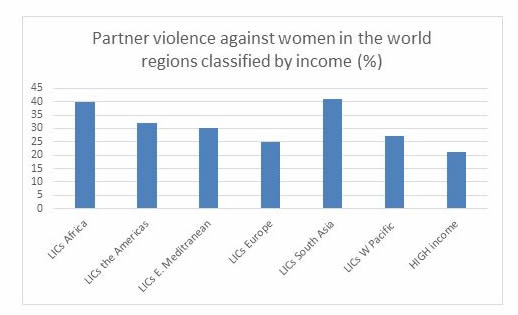
Note: LICs (Low Income Countries)
Source: Authors’ computations based on data from WHO (2019)
Incidence of domestic violence in Africa is particularly concerning, especially in some countries such as Uganda, Cameroon, Democratic Republic of Congo, and Zambia where the proportion of women who had experienced violence in recent period was shocking, exceeding 50%. In most other countries the spread of violence by intimate partners was not that low suggesting that Africa has a record level of women suffering due to violence. It is easy to infer that the COVID-19 would escalate the state of domestic violence in Africa as some of the underlying factors include lack of bargaining power in the household on resource sharing which is aggravated in the COVID-19 world.
Figure 2: Prevalence of domestic violence among women in selected African countries (%)
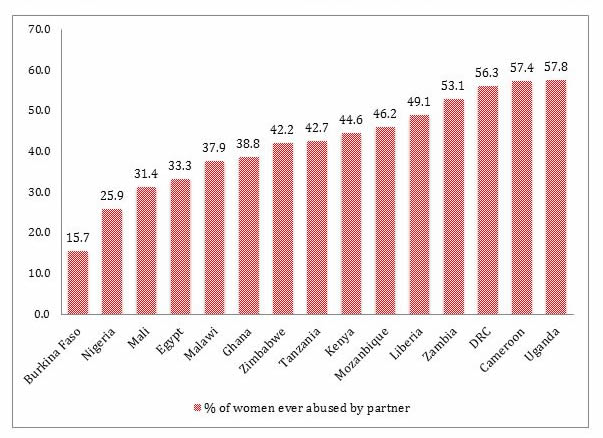
Source: African Development Report (2015), African Development Bank
Domestic violence against women and children may take the form of psychological, sexual, reproductive, physical or economic violence by an intimate partner or a family member. The broader term is family violence, including elder abuse, child abuse, or just violence between family members. This violence may inflict on the victim’s mental health in the form of anxiety, emotional distress, eating and sleeping disorders, low self-esteem. Available evidence for Africa suggests that there is high degree of correlation between physical, verbal and sexual abuses, sometimes taking place concurrently (see Figure 3). The strength of correlation among the various forms of violence is more pronounced in countries where prevalence of domestic violence is very high, such as Uganda and Zimbabwe, often with limited or no recourse mechanism to hold accountable the perpetrators. Some anecdotal reports indicate that law enforcement, and rule of law tended to have been degraded in the wake of the COVID-19 policy responses. Hence, reporting domestic violence to law enforcement agencies and getting justice has been impeded by the COVID-19 situation and the likelihood of incidence rising during this time.
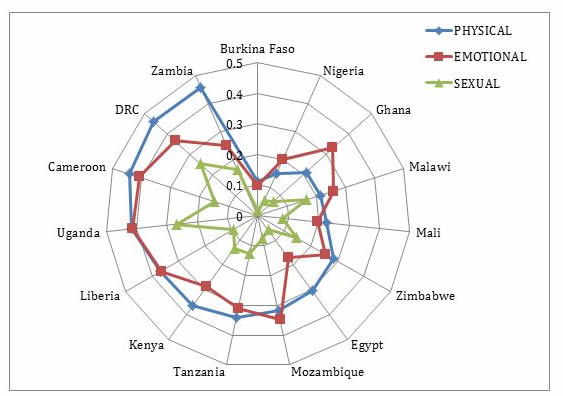
Source: African Development Report (2015), African Development Bank
The challenge
With Covid-19, the victims are at home with the abusers. They cannot make distress calls. The health services have diverted to fight the pandemic, and safe houses have converted to isolation centres in some cases. Local organizations may not be having enough money to address the problem. There is little or no access to legal aid and reproductive health services. People are also scared of going to a hospital, for they may contract the disease. The law enforcement is busy enforcing lockdowns and curfews, and if they were to arrest everyone involved, the police cells and jails need to keep the social distance a time when countries are trying to decongest their prisons. The courts in most countries are not operating at full capacity, with most of the judges working online.
Women have always carried a heavy burden in times of crisis. Besides violence, women, girls, and the poorest in the society are likely to bear the responsibility brought about the disease for a long time with a lack of family planning services—early teenage pregnancies. The challenges faced by Covid-19 are unprecedented, and no government or organization had a proper and sufficient plan.
Who is affected by domestic violence?
According to (AMBURG 2016), most victims of domestic abuse are women accounting for 76%. Domestic violence also accounts for 21 percent of violent crimes in the USA. UNFPA estimates 31 million cases of GBV if the lockdown continues for the next six months (UNFPA, 2020) child marriages will also be on the rise sharply given that children are at home for long periods. Lack of reproductive services is likely to affect 47 million women in low from 114 developing countries classified as small, and medium income will not access contraception. Over 7 million unintended pregnancies may arise from a lack of reproductive health services. Rising incandescence of rape and incest due to lockdown will also increase tremendously, and so is teenage pregnancy. Young children are also likely to experience violence either directly or indirectly.
Poverty and intimate partner violence
We are likely to see the rise of economic abuse and social abuse. Low-income women are more likely to experience intimate partner violence, and unemployed men are more likely to perpetrate it. The evidence for Africa suggests that the intensity of violence experienced by women is affected by the type of employment they have. Women that work generally outside of home tend to experience less violence than those that either work for themselves (self-employed) or stay at home to do domestic chorus (Figure 4)
Figure 4: Domestic violence and Women employment (%)
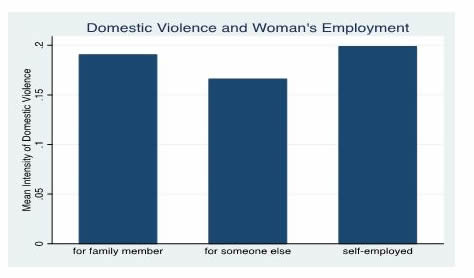
Source: African Development Report (2015), African Development Bank
Women are more likely to work in the service industry that has been affected profoundly. More women are informal wage workers and have lost income. Economic instability prevents women from leaving abusive relationships.
Gender roles
With schools closed and most family members are not working, women mostly bear the burden of care in most societies. In most communities, abuse is justified and accepted as a way of disciplining a woman when she questions the authority of a man. It is more justified in patriarchal societies, and this may go unpunished since it is a norm. Women in most African countries do not own land since men inherit the property from their parents while women do not. Abused women have nowhere to go with their children, and hence they must stay with the abuser.
What can be done?
Improving the rule of law and criminal justice system is as important as treating domestic violence as a public health emergency.
Should we treat domestic violence through the criminal justice system or as a public health emergency? I argue that both are important. There is a need for crisis intervention. As a preventive measure, individuals should be encouraged to be aware of the mental health impacts of COVID-19 and its manifestations due to increased violence, psychological and physical abuse of women, minors and other vulnerable groups. These incidences are likely correlated with measures taken by governments to reduce human contact through reduced mobility. According to data released by Google, lockdowns reduced significantly mobility of people in major cities in Africa. According to Figure 5, information gathered by tracking mobile phone with Google map applications show that movements to retail stores (markets), groceries and workplaces declined steadily on a daily basis from February 19, 2020 for nearly three months across African cities impacting the livelihoods of millions of people, especially women where the majority are engaged in retail trade and services. Loss of income, confinement, and caring for family adds to the burden of women and fuels tensions within a household. As a result of these factors, anecdotal evidence and news reports across Africa suggest a rising trend of incidence of domestic violence, sexual abuse of minors, spread of incest and other forms of abuses. Given the significant resource constraints, most African governments are unable to provide income support, nor counselling nor legal protection for the unintended consequences of fighting the pandemic. Still there are practical measures they can take to mitigate the incidence of domestic violence by mobilizing and empowering communities, strengthening civil society organizations as well as educating the law enforcement agencies without incurring significant financial resources.
Figure 5: Patterns of lockdowns in Africa to contain the spread of the virus causing COVID-19
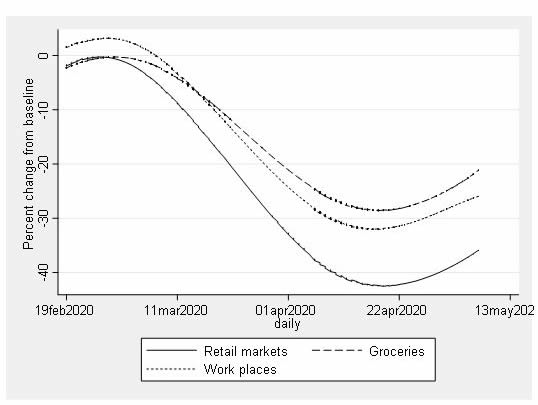
Source: author’s computations based on data provided by Google for 54 African countries (https://www.google.com/covid19/mobility/.)
In cases where families have lost income, alternative income should be considered. Governments and civil society could come up with plans to take care of the vulnerable as they search alternative ways of survival. Citizens should stay informed, avoid too much time on social media, exercise even in self-quarantine, and ensure they have a regular sleep, regular diet and adjust to the realities of life that has now become a new normal.
Policy and budget Interventions
Domestic violence prevention and control should be included as an essential service. There is a need for all policymakers to include domestic violence as part of the COVID-19 health response plan. Particular emphasis should go to those health workers who are women and maybe experiencing stigma in their homes (World Health Organisation, 2020) . The Kenya civil society (Gitau, 2020) has called for the government to allocate 30% of the money received as donations and loans towards implementing Gender-Based Violence initiatives, including prevention and response strategy.
Judicial systems should prioritize gender-based violence cases, shelters as essential services should be help. A unique code should be developed for those experiencing domestic violence to communicate to the outside world. Sexual reproductive health policy in times of crisis should be done by governments. All COVID-mitigation plans should take into consideration the unique circumstances of the citizens.
Information
Information on gender-based violence should be made available to women and girls in ways that they can access with special considerations to their particular environment. Women should have a safe way of alerting authorities and report abuse. The government should sponsor electronic and social media information so as to address gender-based violence.
Community structures
Empower grass-root organizations and institutions to deal with gender-based violence. Health institutions should also be strengthened, and resources allocated to deal with violence against women and children. In areas where there are online services. Appropriate investment in online services and resources where women can seek help. Information can also be disseminated online. In New York, women can use code words when they visit a pharmacist to alert authorities that they are in trouble.
Bibliography
AMBURG, J. V. (2016, June 2). This is How Many Women and Families are Affected by Domestic Violence. Retrieved from Time: https://time.com/4354035/domestic-violence-statistics/
Gitau, J. (2020, April 28). The Shadow Pandemic: Kenyan Civil Society Demands Concrete Action to Protect Women and Girls During COVID-19. Retrieved from Equality Now: https://www.equalitynow.org/shadow_pandemic
UN chief calls for domestic violence ” ceasefire” amid “horrifying global surge”. (2020, April 6). Retrieved from UN News: https://news.un.org/en/story/2020/04/1061052
UNFPA. (2020, April 27). Impact of the COVID-19 Pandemic on Family Planning and Ending Gender-based Violence, Female Genital Mutilation and Child Marriage [EN/AR]. Retrieved from Relief Web: https://reliefweb.int/sites/reliefweb.int/files/resources/COVID-19_impact_brief_for_UNFPA_24_April_2020_1.pdf
World Health Organisation. (2020, March 26th). COVID-19 and violence against women What the Health Sector/System can do. Retrieved from World Health Organisation hrp Research for Impact: https://www.who.int/reproductivehealth/publications/emergencies/COVID-19-VAW-full-text.pdf
- The ageing population of Africa is increasing, so it’s suffering - October 10, 2021
- Are social protection programs effective in caring for the elderly in Africa? - October 5, 2021
- For whom the bell tolls? Social Protection in Africa during Covid-19 pandemic - September 30, 2021

